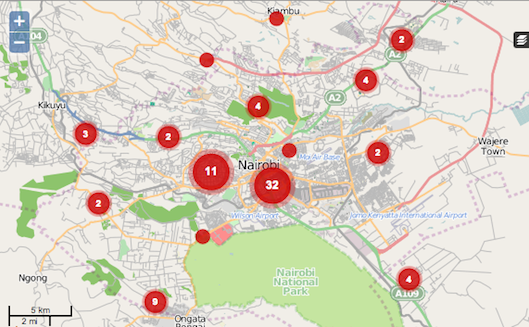5 Innovative Ways to Crowdsource Better Governance

 Whenever I hear people in the Arab region complain about the traffic, I tend to laugh. With the exception of Cairo, which has been bestowed the honor of the ‘loudest city in the world’ because of its truly atrocious drivers, the traffic here is nothing compared to most African cities. On a rainy afternoon in downtown Nairobi, Kenya, it can take a taxi two hours to move half a kilometer.
Whenever I hear people in the Arab region complain about the traffic, I tend to laugh. With the exception of Cairo, which has been bestowed the honor of the ‘loudest city in the world’ because of its truly atrocious drivers, the traffic here is nothing compared to most African cities. On a rainy afternoon in downtown Nairobi, Kenya, it can take a taxi two hours to move half a kilometer.
Why is it so bad? The answer is simple: governance.
Although Kenya’s brand new constitution sets forth a mandate for one of the best democracies in the world, without mechanisms for citizens to voice their problems and incentivize politicians to take action, it’s worth nothing more than the paper it’s printed on.
Rampant corruption, a lack of accountability, and political impunity tend to perpetuate, failing to fix issues like overflowing traffic and broken water systems.
Sometimes even democracies need a little help. Now technology is paving the way.
In Kenya, home of Africa’s m-revolution, new apps, platforms, and ways of crowdsourcing information from citizens and civil society organizations are shifting the dynamics of power, and changing the way Kenyans benefit from their government and each other.
In a recent piece titled “Kenya’s Propensity to Crowdsource,” Wilfred Mutua of Afrinnovator noted that, “Crowdsourcing essentially is not novel to the Kenyan digital scene unlike other African countries…. What we are seeing in Kenya is a lot of passive innovation in the way real-time information is being used on social media or the way in which conversations are directed.”
Where conversations were once one-way (government to citizens), technology is now allowing for multi-directional discussions that bring greater accountability and transparency.
Here are a few examples:
- CarPoolKE- Uniting Citizens
Last month, when a Matatu strike (Matatu are the public minibuses which most of the city’s residents use to get to work each day) crippled Nairobi’s public transportation sector, the government failed to offer a helping hand.
Instead, a few Kenyans took to twitter and launched the hashtag #CarPoolKE, to help connect potential carpoolers. Once the Kenyan Red Cross began retweeting the hashtag, a collective force of ride-seekers and ride-sharers became a transport movement sweeping the city.
- Ushahidi- Crowdmapping Information
Kenya is also the birthplace of Ushahidi, the groundbreaking platform that has redefined crisis mapping by crowdsourcing information from multiple channels, including SMS, email, and Twitter.
Ushahidi, which literally means "testimony" in Swahili, was initially developed to map incidents during Kenya’s 2008 post-election violence. Now the open-source platform has been adapted around the world to promote citizen journalism, map crises, monitor elections and more.
With Kenya’s first presidential election since 2007 scheduled for March 2013, the Ushahidi platform is now lending its technology to Uchaguzi, which is helping monitor the electoral process by mapping incidences of hate speech, violence, polling station issues and even “positive events” reported by citizens and civil society organizations.
- Mzalendo- Keeping an eye on parliament.
Mzalendo (‘Patriot’ in Swahili), launched in 2003, makes information on publicly elected officials well, more public. It posts live online “report cards” on Kenya’s Ministers of Parliament, profiling and tracking their work, attendance records and political stances. Mzalendo’s main goal is to promote greater awareness of what actually goes on in the National Assembly, and increase participation in politics by giving citizens easier access to public information on their officials.
- Faini Chap Chap & I Paid a Bribe– Increasing transparency
Sometimes, the government does help. Faini Chap Chap, launched a few months ago by Kenya's Chief Justice, is a new system for paying traffic fines through M-Pesa (Kenya’s mobile payment platform). It aims to increase transparency and reduce corruption, since M-Pesa transactions are tracked, and it saves traffic offenders the trouble of having to stand in long queues to pay fines.
If a traffic cop still insists you pay him ‘directly,’ a few crafty citizens have developed another option to set the record straight. I Paid A Bribe, a site dedicated to “uncovering the market price of corruption,” encourages citizens to anonymously report attempted bribery. So far there have been nearly 1,200 bribe reports, citing a total of over half a million dollars.
- Majivoice & M-Maji- Giving consumers a choice & voice
Kenya’s water sector flows with more corruption than water itself. Fortunately, there are now nearly 11 water-focused apps and startups working to improve this.
One of them, M-Maji, whose name means “mobile-water” in Swahili, is a mobile application developed by a group of Stanford University students to improve clean water access in the slums. Through a basic mobile phone, M-Maji offers consumers better knowledge about water availability, price, and quality. Water vendors can use their mobile phones to advertise on M-Maji, and water buyers can use its database to find the closest, cheapest, and cleanest water.
MajiVoice is another new platform designed to improve dialogue between citizens and their water service providers. Water customers can use a mobile phone or website to share their service complaints, and receive quick feedback. MajiVoice is currently being piloted by the Water Services Regulatory Board (WASREB).
Kenya’s propensity towards crowdsourcing is growing, and with it will come great benefits for citizens, and more opportunities to make the little voices heard. Whether the government chooses to listen is another question.


